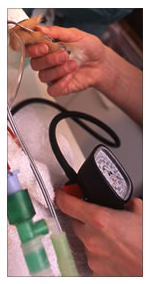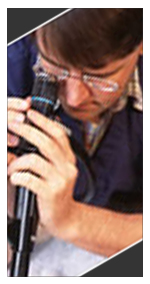 |
|
|
This area of our practice deals with the day to day ailments of pets. These include common problems such as skin conditions, ear irritation, stomach upsets with diarrhoea or vomiting, coughs, hormone problems etc. Advanced diagnostic and surgical procedures are also part of our service.
We encourage preventive medicine and offer a full range of vaccines to protect your pet against diseases of the region and overseas.
|
 |
|
|
We stock a range of vaccines and will decide on a regime to suit your pet based upon lifestyle and countries you may visit in the future.
Let us know when you plan to travel with your pet. Some countries request that special vaccines should be given at specific times. There may also be requirements to NOT give certain vaccines in order to comply with a destination country's regulations.
We are very good at treating disease but prevention is better than cure and the RAH supports preventive care for pets.
Preventive medicine to guard against many diseases is the best way to look after your pet's health.
|
 |
|
|
We have a large range of anaesthetics available for animal use including propofol, isoflurane and a number of different painkillers for various situations. Cost conscious owners of fit animals could choose less expensive options but we strongly recommend the routine use of the newer anaesthetic agents where possible, and especially where pets are older or debilitated in some way.
Anaesthesia is monitored with ECG (Electrocardiogram), pulse oximetry and, most important, trained human attention. Our technicians are all highly competent in anaesthetic monitoring.
|
 |
|
|
Surgery Here at the RAH we perform all routine surgical procedures and have vets with special interests in orthopaedic (bone) and advanced soft tissue/ cancer surgery.
Elective surgery is performed Sunday to Thursday (emergency any time of course) and pets should have food withdrawn from 10 pm the night before.
Radio Surgery is used at the RAH and in many ways is the modern alternative to the scalpel, allowing almost bloodless surgery.
|
 |
|
|
This is an important part of general health care and crucial to your pet's well-being.
Check your pet's mouth for accumulation of plaque (that hard yellow or brown deposit that builds up under or around the gum edge). Check also for gum recession, redness at the gum edges and bad breath.
Signs of any of these could mean that your pet needs dental attention. We no longer regard mouth problems as trivial. We know that tooth and gum disease can lead to problems later and good oral hygiene is part of the overall preventive health care problem.
|
 |
|
|
Dedicated nursing care is provided for all our in-patients – the level of presence in the hospital wards being dependent on a patient's needs. Constant monitoring is provided when needed.
Our own Veterinary team are always the first line of call for our inpatients – maintaining case continuity and the best care possible for these hospitalised patients.
on what we have and how we look after our patients:
|
 |
|
- Hospital wards - SEPARATE cat and dog wards with a strict isolation ward for infectious cases.
- Intensive care oxygen - the temperature, humidity and oxygen can be controlled helping some of our more delicate and poorly patients.
- Variety of cage and kennel sizes dependent on patients' needs
- Stainless steel cage and kennelling allows for optimum cleaning and thus reducing infection risk.
- Kennels and cages positioned and screened in such a way that individual patients are never face-to-face and thus avoids potential confrontation and stress for our pets.
- Lighting can be reduced to low levels again to reduce stress for our patients.
- Comfortable ambient temperature kept steady with climate control units.
- Background music available to help keep the calm atmosphere within the wards.
|
|
|
 Blood pressure measurement has long been a fundamental part of human health and is now available for animals. This allows earlier detection of many problems that would otherwise remain undiagnosed. Blood pressure measurement has long been a fundamental part of human health and is now available for animals. This allows earlier detection of many problems that would otherwise remain undiagnosed.
Special equipment accurately assesses pet's blood pressure.
Anaesthetic safety is dramatically improved when blood pressure is maintained within normal parameters.
|
 |
|
|
X-rays are familiar to everyone and radiology remains the most important imaging tool.
Ultrasound is perhaps the most exciting imaging method to arrive on the veterinary practice scene in recent years.
With ultrasound we can look into the depths of the body's organs and assess structures and blood flow patterns without recourse to exploratory surgery. Most pets don't need sedation for ultrasound.
|
|
|
 Our small rigid 'scope is essential for avian practice and is extremely useful in general pet practice too. With our flexible endoscope we can view the intestine and respiratory tracts, retrieve swallowed objects and take tissue samples for laboratory assessment later - all without the need for surgery. Our small rigid 'scope is essential for avian practice and is extremely useful in general pet practice too. With our flexible endoscope we can view the intestine and respiratory tracts, retrieve swallowed objects and take tissue samples for laboratory assessment later - all without the need for surgery.
|
 |
|
|
We use the Vettest chemistry with SNAP for hormone assessments, electrolytes and QBC haematology analysers to provide rapid and accurate laboratory reports for our patients. No more waiting a day or more for blood results. We can have a full profile in about 20 minutes. We also utilize Rapid tests for quick diagnosis of the most prevalent infectious diseases in Kuwait including Parvovirus and Distemper in dogs and FIV in cats.
Fast answers mean faster and better treatment for your pet. Additional diagnostic tests are possible with courier transport of blood or tissue samples overseas to renowned veterinary specialist laboratories when required.
|
 |
|
|
Psittacines such as African Grays, Cockatoos and Budgerigars are the most common birds seen in our practice, and we have considerable experience with these. Canaries and Bulbul are also popular. We recommend and stock "Harrison's" avian diets for optimum nutrition. Many problems in psittacines seen here are related to poor quality feeding, particularly with overuse of sunflower seeds. Collect a diet sheet with our recommendations when you visit.
Note that a number of species are regarded as endangered and international transport of them may be restricted. You may not be allowed to take the African Gray bought from a local souk (market) back to your home country without special permission and documentation.
|
 |
|
|
These are common in Kuwait and we have developed some experience with baboons and numerous reptiles such as snakes, turtles, terrapins, tortoises and iguanas to name but a few.
Kuwait subscribes to the voluntary code of practice governing the movement of endangered species, CITES. Movement of certain species is restricted and special permission may be required. This can apply to pet birds - many psitaccine species are on the CITES lists.
|








 Blood pressure measurement has long been a fundamental part of human health and is now available for animals. This allows earlier detection of many problems that would otherwise remain undiagnosed.
Blood pressure measurement has long been a fundamental part of human health and is now available for animals. This allows earlier detection of many problems that would otherwise remain undiagnosed.
 Our small rigid 'scope is essential for avian practice and is extremely useful in general pet practice too. With our flexible endoscope we can view the intestine and respiratory tracts, retrieve swallowed objects and take tissue samples for laboratory assessment later - all without the need for surgery.
Our small rigid 'scope is essential for avian practice and is extremely useful in general pet practice too. With our flexible endoscope we can view the intestine and respiratory tracts, retrieve swallowed objects and take tissue samples for laboratory assessment later - all without the need for surgery.

